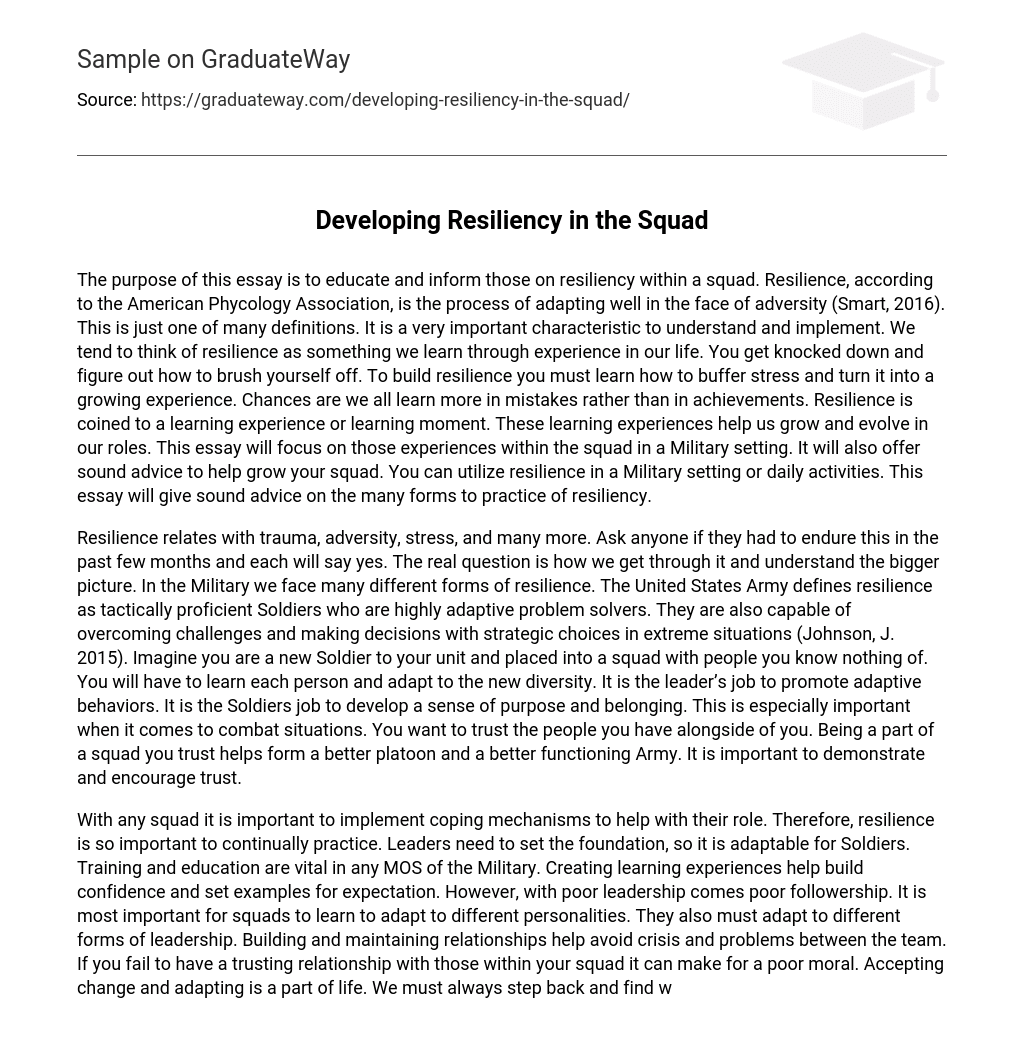The purpose of this essay is to educate and inform those on resiliency within a squad. Resilience, according to the American Phycology Association, is the process of adapting well in the face of adversity (Smart, 2016). This is just one of many definitions. It is a very important characteristic to understand and implement. We tend to think of resilience as something we learn through experience in our life. You get knocked down and figure out how to brush yourself off. To build resilience you must learn how to buffer stress and turn it into a growing experience. Chances are we all learn more in mistakes rather than in achievements. Resilience is coined to a learning experience or learning moment. These learning experiences help us grow and evolve in our roles. This essay will focus on those experiences within the squad in a Military setting. It will also offer sound advice to help grow your squad. You can utilize resilience in a Military setting or daily activities. This essay will give sound advice on the many forms to practice of resiliency.
Resilience relates with trauma, adversity, stress, and many more. Ask anyone if they had to endure this in the past few months and each will say yes. The real question is how we get through it and understand the bigger picture. In the Military we face many different forms of resilience. The United States Army defines resilience as tactically proficient Soldiers who are highly adaptive problem solvers. They are also capable of overcoming challenges and making decisions with strategic choices in extreme situations (Johnson, J. 2015). Imagine you are a new Soldier to your unit and placed into a squad with people you know nothing of. You will have to learn each person and adapt to the new diversity. It is the leader’s job to promote adaptive behaviors. It is the Soldiers job to develop a sense of purpose and belonging. This is especially important when it comes to combat situations. You want to trust the people you have alongside of you. Being a part of a squad you trust helps form a better platoon and a better functioning Army. It is important to demonstrate and encourage trust.
With any squad it is important to implement coping mechanisms to help with their role. Therefore, resilience is so important to continually practice. Leaders need to set the foundation, so it is adaptable for Soldiers. Training and education are vital in any MOS of the Military. Creating learning experiences help build confidence and set examples for expectation. However, with poor leadership comes poor followership. It is most important for squads to learn to adapt to different personalities. They also must adapt to different forms of leadership. Building and maintaining relationships help avoid crisis and problems between the team. If you fail to have a trusting relationship with those within your squad it can make for a poor moral. Accepting change and adapting is a part of life. We must always step back and find ways to grow and develop. One keyway to do this is being open minded in times of stress and diversity. Having a functioning squad with trust makes for a safer and more successful squad. Safety is most important especially in high risk jobs within the Military. Being proficient and safe protects yourself and your team.
To summarize, daily practices of critical thinking and handling emotions help build resilience. As stated, there are many different performance skills to consider when a squad is trying to build or develop resilience. One is constructive criticism. When faced with adversity, everyone in the team should create a sense of belonging and self-worth amongst the squad. Nevertheless, it is essential to criticize each other. Those criticisms should be encouraging to support them as they try to solve problems (Ekwelle, 2020). It is best practice to start with an encouraging comment rather than all negative. Only hearing negative feedback can cause low morale. It also can cause conflict and poor attitudes within the squad. Feedback should be constructive but also point out positives as well to the Soldier. Throughout the Army resilience will continue to practice not only in a squad but Military wide. This is because it is the leader’s job to point out faults and educate. In turn it allows for growing experiences and teaching moments. Leaders are the backbone of the Army. Members of the team groom each other for future leadership roles. The Army thrives on smart and adaptable members.





